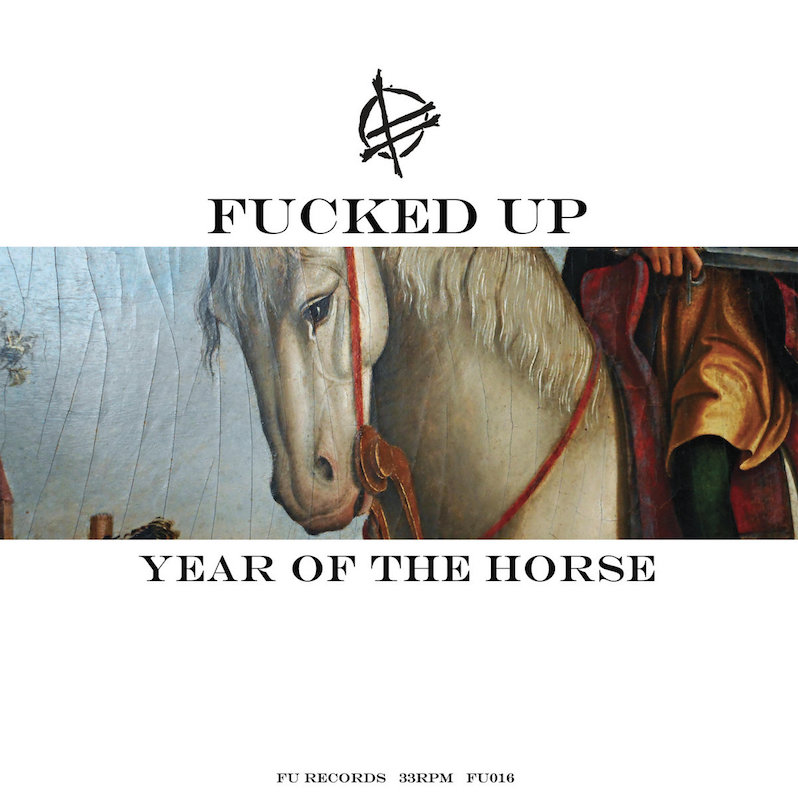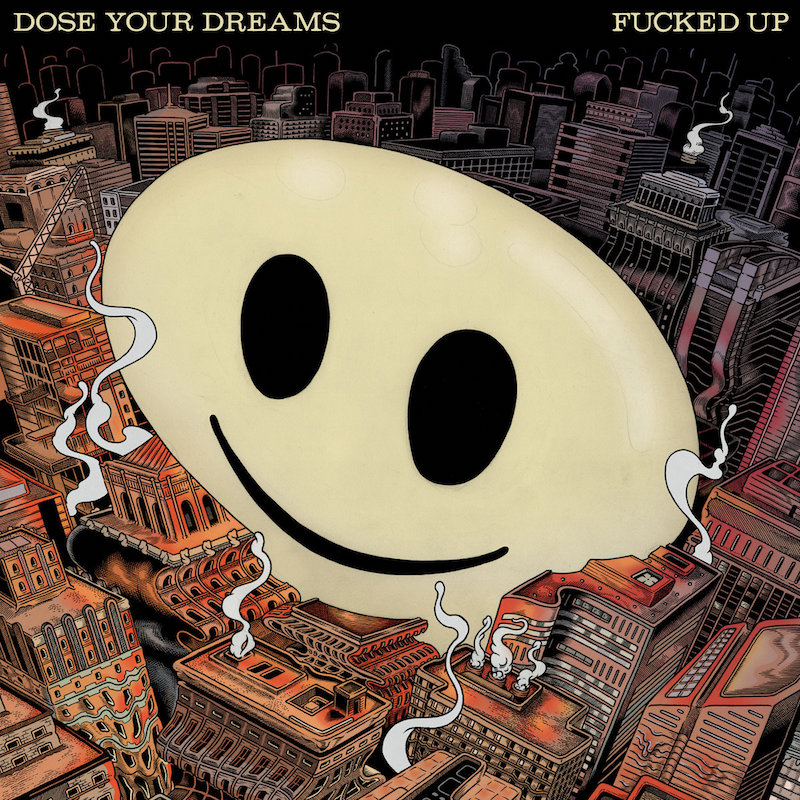Fucked Up : Year of the Horse

Thank god this far into their career we can do away with any early equivocations about the transcendental hardcore band’s name and get right to the meat of the matter. Fucked Up have always been a curiosity in the world of hardcore, emerging from its cracked concrete soil but quickly cannibalizing wider musical worlds, as comfortable with the wild worlds of progressive rock in its myriad forms as they were with dance music, pop hooks and lysergic visionaries. Musically speaking, only the earliest 7-inches of the band really cohere to hardcore as we know it; even as soon as their LP debut Hidden World they had embraced more the panoramic alternative rock vision of all-time greats Hüsker Dü more than they had sought to recapture the power Dead Kennedys and Black Flag once possessed. To an indie and alternative rock fan, this is perhaps how the band may have seemed forever, a capable and worthy seizing up of a spirit of adventurousness in the same vein as the breadth the Replacements, Primal Scream and the aforementioned Hüsker Dü once showed. And, constrained simply to their studio LPs, and, beyond that, simply to the music, there is a strong argument for this view.
But the secret weapons of Fucked Up are two-fold. First is their profound musical depth, often obscured by how few “proper” studio LPs they’ve released. Proper is in scare quotes there because, under the noses of many, the group have released a number of full-length 12-inch records that are simply not catalogued as studio albums. There are the obvious ones many know about such as the “compilation” David’s Town in which the group produced a record-within-a-record, a document of songs from inside the world of their long-running character David (more on him later). But there are others, such as This Mother Forever, a shapeshifting two-song LP totalling roughly 45 minutes of swirling psychedelia, drones and new age music, reading like a mystic meditation upon the mysteries more than anything even within the same world of hardcore. Their first two studio albums read as compilations of the varied and often wildly differing ideas captured by the group in their perpetual stream of 7″s, 12″s and side records. It was really only as of David Comes To Life as its commitment to a proper narrative that the band began the process of making studio releases hold a firmament of direction, each song living comfortably within each other rather than radically challenging the ground of one another.
But the deepest music well of the group by far has been the Zodiac series, a series of side records attempting to capture in some way the various signs of the Zodiac one by one that the group has been releasing as a parallel discography to their main work for the duration of their career. This sentiment is quite literal; the group’s studio debut was released in 2006, the precise year as the first of the Zodiac albums, feeling at times like two bands from alternate dimensions emanating from the same source. If the primary releases of the group document Fucked Up as a post-Hüsker Dü adventurous alternative rock band and their various non-album singles document the group as a hardcore band, then the Zodiac series is the legacy of the group as full on progressive rock. The songs have always been long in this format, with the shortest “Year of the Dog” coming in at just under 9 minutes and the longest (prior to this one) “Year of the Snake” clocking in at a mighty 24 minutes. Their command of prog shown here isn’t a layman’s understanding of the genre, either; there are as many shades of Nektar and Captain Beyond as there are King Crimson and Jethro Tull, just as many glimmers of Porcupine Tree and the world of Steven Wilson as the Swedish depths of Anekdoten and the Germanic synthesizer seas of Klaus Schulze. This sense of near total musical separation from their LPs alongside the conceptual singularity of the work only intensifies the perception of the Zodiac series as a parallel discography, a different band with the same name and the same people, a kind of conceptual inversion or alternative evolutionary path of the group.
The second of the band’s secret weapons, however, and one often overlooked when discussing them, is the radiant poeticism of vocalist and lyricist Damian Abraham. His work with the group, often admittedly enabled or enjoined by fellow band members as lyricists, has always been traced with lines of alchemy, magick, the language and images of the spirit realm and the mystical as a bleedthrough liminal space between the world of the living and the contortions of the purely psychological realm. The poetic lysergia of the group, hidden behind his often animal howl, reads like the assembled fragments of a dream, the potent symbols of Masons and Catholics and Sufi mystics and cave-dwelling rabbis emerging from the lazarus desert, carrying scarves and scrolls plucked from the feathered darkness of God. These are wisely interrupted by brief lines, capturing refrains, which seem like beams in this swirl of William Blake and Faulkner that pierce directly the flesh of life, something to hang your hat on and make the mobile of images and symbols make concrete emotional and experiential sense. You may not know on the outset what “black albino bones” might be but one listen to the song of the same title and you know. Nowhere is this more evident than the Zodiac albums which, musically unmoored from lay approachability, act as a vehicle for the full effulgence and mystic fervor capable by the band. Even David, long a character emerging and submerging within the broader mythos of the group, feels often like a psychic bathysphere, the precise emergent crossover between the divergent timelines of the group’s mainline albums and the intense mystic meditations of the Zodiac records.
These threads entwine on Year of the Horse, the skeleton upon which the mighty tapestry is hung. This is, after all, the first of the Zodiac records to be designated a studio LP by the band, despite previous Zodiac records hovering in the 30-40 minute range not unheard of for rock or punk records. (Even Yes’ Close to the Edge, the radiant crown jewel of progressive rock, is a scant 40 minutes itself.) This one, admittedly, immediately makes its case for such a designation known: despite being separated into four tracks, the album is, like Transatlantic’s record from earlier this year, a single 90-minute song in roughly 20 movements. Two of Fucked Up’s previous studio LPs had been concept records, those being 2011’s David Comes to Life as well as their previous LP Dose Your Dreams, but even Dose‘s double LP length pales in comparison to this absolute monster of a record. Thankfully, the group is well aware, especially given their clear and sincere love of progressive music, of the necessities accompanying such a mighty undertaking. As such, there are hooks aplenty both melodic and emotional, one-off segments and repeating musical motifs, an abundance of poeticisms and slicing, emotionally demanding provocations.
This “song” is a meditation as the other Zodiac songs of course; it is the wild fire and demonic braying of Cormac McCarthy especially of Blood Meridian and Outer Darkness, the pursuit of pitch black cowboys which seem plucked from the pure bowels of hell sliding like oil and shadow across the sands in pursuit of the white horse, a chase toward Golgotha and Gethsemane where at last the vicious satanic devouring jaw might sink into the blood-rich flesh of heaven’s child. But just as much as it loses itself in the intensities and furies necessary for these heart-sprouting war-time visions, Fucked Up wisely open it up lines that serve both explicit narrative function but also punch through as emotional proclamations. There is mystery here, certainly, elements that would be impossible to describe but instead must be ruminated upon, symbols and developments that are for the innermost heart and not the critic’s pen, but the purpose of this mystery is never obscure. You know in minutes why this record exists and what they are trying to convey; with each turn of heavy metal thunder and enormous soaring tear-streaked repeating chorus, you see the purpose in their novelistic intensity.
Label: FU
Year: 2021
Similar Albums:
Langdon Hickman is listening to progressive rock and death metal. He currently resides in Virginia with his partner and their two pets.




